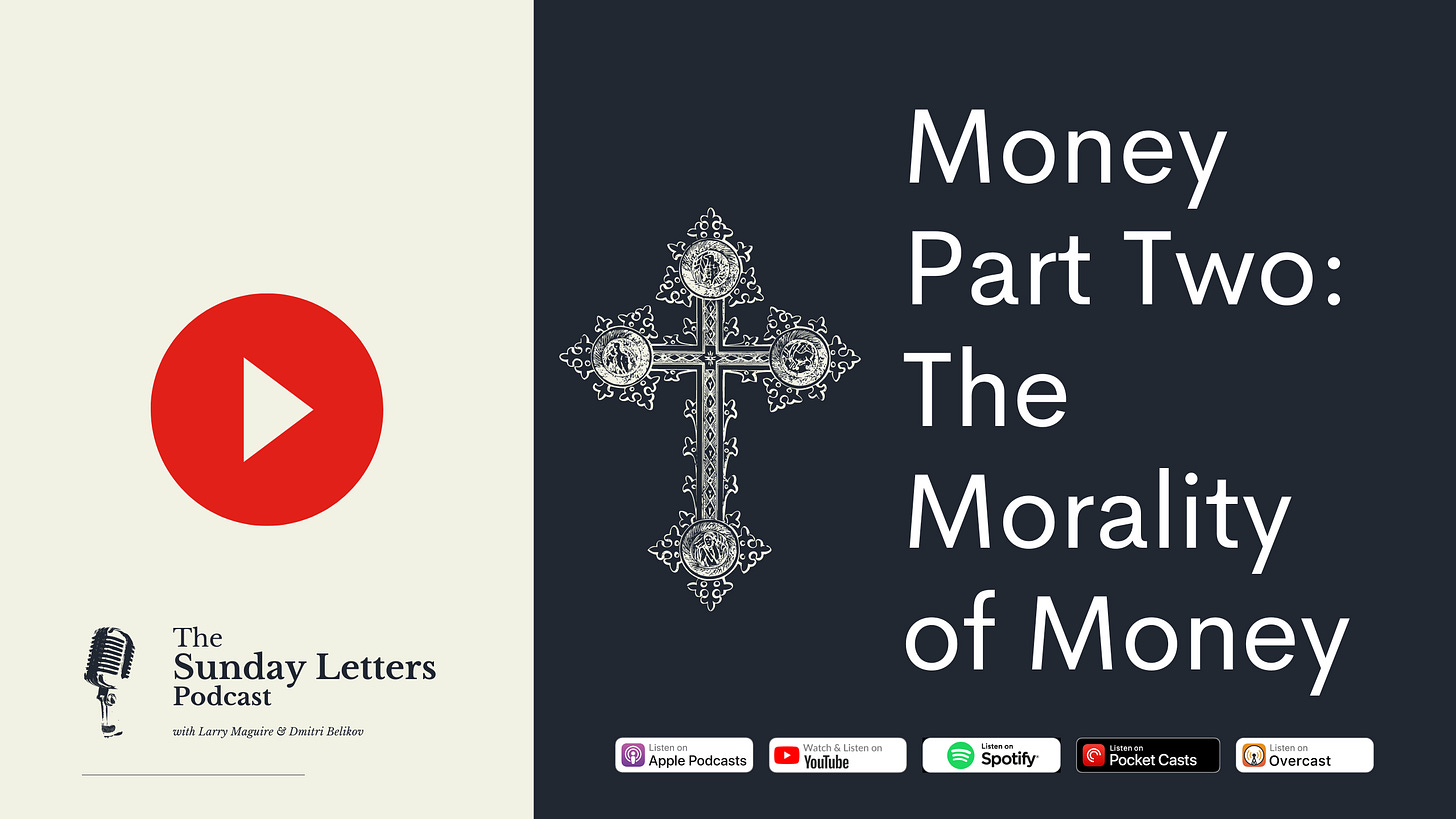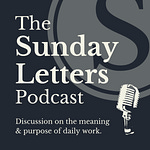Welcome to this week’s edition of the podcast. If you like what we’re doing, consider becoming a paid subscriber. If you’d rather not, you can offer a one-off tip here, or get yourself some merch here. Many thanks for your support!
In our latest episode of The Sunday Letters Journal podcast, Dmitri Belikov and I delved into the complex topic of the morality of money. This discussion is not just about the practicalities of economics but rather about the more profound moral questions that underpin our financial systems, our relationship with one another, and our sense of humanity and everyday existence.
The discussion begins by reflecting on the importance of money in our society. It’s impossible to talk about work without mentioning money because we’ve collectively decided that money is essential to our way of life. We dedicate a significant portion of our lives to work, often at the expense of truly living. The question arises then: why do we work? What is the purpose of work? Can we survive without effectively working as waged slaves for the best part of our lives? This leads us to the fundamental question of what it means to be moral in the context of making and spending money.
We both have been reading David Graeber’s “Debt: The First 5,000 Years”1, which provides a substantial historical backdrop to our conversation. One of the core ideas we discussed is the concept of morality itself. Dmitri explained that morality involves a set of rules or principles that govern behaviour, and these principles can be understood through different philosophical lenses, such as deontology and utilitarianism. Deontology, as championed by Immanuel Kant, posits that there are universal moral laws that apply to everyone, regardless of the consequences. In contrast, utilitarianism, or consequentialism, suggests that the morality of an action is determined by its outcomes, specifically whether it maximises happiness or utility for the greatest number of people.
As we delved deeper, we touched on the historical perspectives of morality and money, drawing on the ideas of ancient philosophers like Plato and Aristotle. Plato condemned the pursuit of money, believing it corrupted the soul by allowing desires to override reason. While also critical of the excessive pursuit of wealth, Aristotle introduced the concepts of use value and exchange value. He argued that goods should be produced primarily for their use value – to meet genuine needs – rather than for exchange value – merely to generate profit. This distinction remains relevant today as we grapple with the implications of producing goods and services primarily for profit and the satisfaction of base-level desires.
Our conversation then shifted to the role of religion in shaping moral views on money. In medieval Europe, the early church maintained a stance against commerce, just as perhaps Aristotle did, viewing profit as inherently deceitful and corrupting. However, as time progressed, the church’s position softened, recognising the necessity of trade for societal functioning. This transition highlights the evolving nature of moral perspectives on money, influenced by changing economic realities. Or it was perhaps due to the church’s increasing ties to wealth and political systems.
We explored how these historical ideas have influenced modern economic thought, particularly through the works of Adam Smith and Karl Marx. Drawing on Aristotle’s distinction between use value and exchange value, Marx critiqued the capitalist system for prioritising profit over human needs. He argued that this focus leads to the exploitation of workers and the commodification of labour, reducing people to mere instruments for generating wealth. This critique remains poignant as we witness the growing inequality and concentration of wealth in the hands of a few.
The discussion also touched on contemporary issues, such as exploiting workers in developing countries to produce goods for affluent markets. We questioned the morality of benefiting from the labour of others in developing countries who are often subjected to inhumane conditions in the production of consumer goods. This raises the uncomfortable reality that our consumer choices can perpetuate systems of exploitation and inequality in the Global South. It forces us to consider whether it is moral to enjoy the fruits of others’ labour when it comes at such a high human and environmental cost.
Historically, religion and royalty wielded significant influence over people’s lives, often using their positions to accumulate personal wealth and control over populations. This dynamic persists today, with corporations and political leaders frequently intertwined, leading to policies that prioritise economic gain over the self-determination of nations and social welfare. The entanglement of money and power raises ethical concerns about the fairness and justice of our economic systems.
Throughout the conversation, we acknowledged that these issues are complex and deeply ingrained in our societal structures. However, we also emphasised the importance of questioning and challenging the status quo. By examining the moral implications of our financial and economic systems, we can begin to envision and work towards more equitable and humane alternatives.
The morality of money is a vast and intricate topic that touches on philosophy, history, religion, and contemporary issues. By understanding the historical and philosophical contexts, perhaps we can better navigate the moral dilemmas that money presents and strive towards a more just and compassionate society.
How do you feel about your work? Take the short survey.
References
Graeber, D. (2012). Debt: The first 5000 years. Penguin UK.












